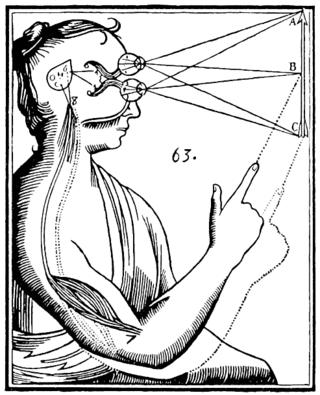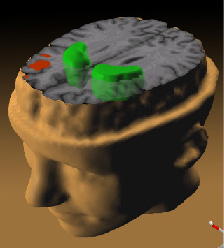Related Research Articles

The Chinese room argument holds that a digital computer executing a program cannot have a "mind", "understanding", or "consciousness", regardless of how intelligently or human-like the program may make the computer behave. The argument was presented by philosopher John Searle in his paper "Minds, Brains, and Programs", published in Behavioral and Brain Sciences in 1980. Similar arguments were presented by Gottfried Leibniz (1714), Anatoly Dneprov (1961), Lawrence Davis (1974) and Ned Block (1978). Searle's version has been widely discussed in the years since. The centerpiece of Searle's argument is a thought experiment known as the Chinese room.
Epiphenomenalism is a position on the mind–body problem which holds that physical and biochemical events within the human body are the sole cause of mental events. According to this view, subjective mental events are completely dependent for their existence on corresponding physical and biochemical events within the human body, yet themselves have no influence over physical events. The appearance that subjective mental states influence physical events is merely an illusion. For instance, fear seems to make the heart beat faster, but according to epiphenomenalism the biochemical secretions of the brain and nervous system —not the experience of fear—is what raises the heartbeat. Because mental events are a kind of overflow that cannot cause anything physical, yet have non-physical properties, epiphenomenalism is viewed as a form of property dualism.

The mind is that which thinks, imagines, remembers, wills, and senses, or is the set of faculties responsible for such phenomena. The mind is also associated with experiencing perception, pleasure and pain, belief, desire, intention, and emotion. The mind can include conscious and non-conscious states as well as sensory and non-sensory experiences.

Consciousness Explained is a 1991 book by the American philosopher Daniel Dennett, in which the author offers an account of how consciousness arises from interaction of physical and cognitive processes in the brain. Dennett describes consciousness as an account of the various calculations occurring in the brain at close to the same time. He compares consciousness to an academic paper that is being developed or edited in the hands of multiple people at one time, the "multiple drafts" theory of consciousness. In this analogy, "the paper" exists even though there is no single, unified paper. When people report on their inner experiences, Dennett considers their reports to be more like theorizing than like describing. These reports may be informative, he says, but a psychologist is not to take them at face value. Dennett describes several phenomena that show that perception is more limited and less reliable than we perceive it to be.

In the philosophy of mind, mind–body dualism denotes either the view that mental phenomena are non-physical, or that the mind and body are distinct and separable. Thus, it encompasses a set of views about the relationship between mind and matter, as well as between subject and object, and is contrasted with other positions, such as physicalism and enactivism, in the mind–body problem.
In philosophy of mind, functionalism is the thesis that each and every mental state is constituted solely by its functional role, which means its causal relation to other mental states, sensory inputs, and behavioral outputs. Functionalism developed largely as an alternative to the identity theory of mind and behaviorism.
In the philosophy of mind and consciousness, the explanatory gap is the difficulty that physicalist philosophies have in explaining how physical properties give rise to the way things feel subjectively when they are experienced. It is a term introduced by philosopher Joseph Levine. In the 1983 paper in which he first used the term, he used as an example the sentence, "Pain is the firing of C fibers", pointing out that while it might be valid in a physiological sense, it does not help us to understand how pain feels.
Eliminative materialism is a materialist position in the philosophy of mind. It is the idea that the majority of mental states in folk psychology do not exist. Some supporters of eliminativism argue that no coherent neural basis will be found for many everyday psychological concepts such as belief or desire, since they are poorly defined. The argument is that psychological concepts of behavior and experience should be judged by how well they reduce to the biological level. Other versions entail the nonexistence of conscious mental states such as pain and visual perceptions.
The knowledge argument is a philosophical thought experiment proposed by Frank Jackson in his article "Epiphenomenal Qualia" (1982) and extended in "What Mary Didn't Know" (1986).

In philosophy of mind, the hard problem of consciousness is to explain why and how humans and other organisms have qualia, phenomenal consciousness, or subjective experiences. It is contrasted with the "easy problems" of explaining why and how physical systems give a (healthy) human being the ability to discriminate, to integrate information, and to perform behavioral functions such as watching, listening, speaking, and so forth. The easy problems are amenable to functional explanation: that is, explanations that are mechanistic or behavioral, as each physical system can be explained purely by reference to the "structure and dynamics" that underpin the phenomenon.
A philosophical zombie is a being in a thought experiment in philosophy of mind that is physically identical to a normal person but does not have conscious experience.
Daniel Dennett's multiple drafts model of consciousness is a physicalist theory of consciousness based upon cognitivism, which views the mind in terms of information processing. The theory is described in depth in his book, Consciousness Explained, published in 1991. As the title states, the book proposes a high-level explanation of consciousness which is consistent with support for the possibility of strong AI.
The inverted spectrum is the hypothetical concept, pertaining to the philosophy of color, of two people sharing their color vocabulary and discriminations, although the colors one sees—one's qualia—are systematically different from the colors the other person sees.

In the philosophy of mind, the China brain thought experiment considers what would happen if each member of the Chinese nation were asked to simulate the action of one neuron in the brain, using telephones or walkie-talkies to simulate the axons and dendrites that connect neurons. Would this arrangement have a mind or consciousness in the same way that brains do?

In philosophy of mind, Cartesian materialism is the idea that at some place in the brain, there is some set of information that directly corresponds to our conscious experience. Contrary to its name, Cartesian materialism is not a view that was held by or formulated by René Descartes, who subscribed rather to a form of substance dualism.
Multiple realizability, in the philosophy of mind, is the thesis that the same mental property, state, or event can be implemented by different physical properties, states, or events.

Type physicalism is a physicalist theory in the philosophy of mind. It asserts that mental events can be grouped into types, and can then be correlated with types of physical events in the brain. For example, one type of mental event, such as "mental pains" will, presumably, turn out to be describing one type of physical event.

Philosophy of mind is a branch of philosophy that studies the ontology and nature of the mind and its relationship with the body. The mind–body problem is a paradigmatic issue in philosophy of mind, although a number of other issues are addressed, such as the hard problem of consciousness and the nature of particular mental states. Aspects of the mind that are studied include mental events, mental functions, mental properties, consciousness and its neural correlates, the ontology of the mind, the nature of cognition and of thought, and the relationship of the mind to the body.

"What Is It Like to Be a Bat?" is a paper by American philosopher Thomas Nagel, first published in The Philosophical Review in October 1974, and later in Nagel's Mortal Questions (1979). The paper presents several difficulties posed by consciousness, including the possible insolubility of the mind–body problem owing to "facts beyond the reach of human concepts", the limits of objectivity and reductionism, the "phenomenological features" of subjective experience, the limits of human imagination, and what it means to be a particular, conscious thing.

In philosophy of mind, qualia are defined as instances of subjective, conscious experience. The term qualia derives from the Latin neuter plural form (qualia) of the Latin adjective quālis meaning "of what sort" or "of what kind" in relation to a specific instance, such as "what it is like to taste a specific apple — this particular apple now".
References
- ↑ Tye, Michael, 2006. "Absent Qualia and the Mind-Body Problem" Philosophical Review, Vol. 115, No. 2, 2006, 140
- ↑ Block, N. 1980, ‘Troubles with functionalism’, in Block, N. (ed.), Readings in the Philosophy of Psychology, Volume 1. Cambridge, Mass.: Harvard University Press.Google Scholar
- ↑ Dennett, Daniel. "Quining Qualia." 1988. Ed. David Chalmers. Philosophy of Mind: Classical and Contemporary Readings. New York: Oxford UP, 2022. 226-46.